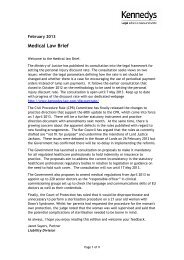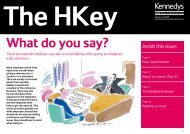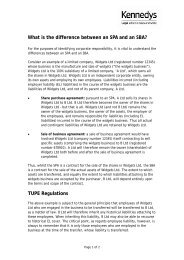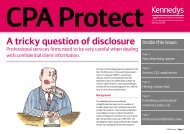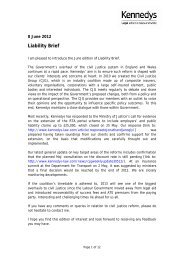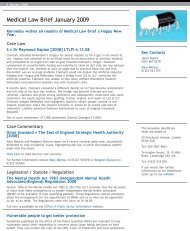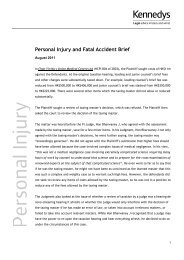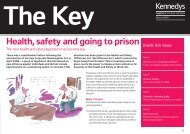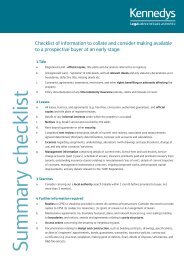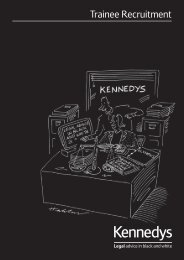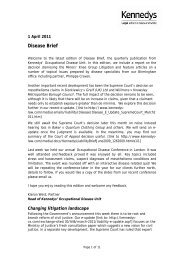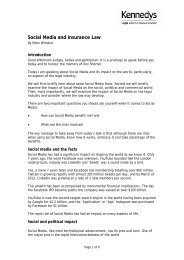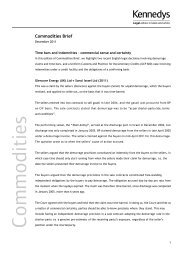Download The Key - Winter 2012 (PDF, 468KB) - Kennedys
Download The Key - Winter 2012 (PDF, 468KB) - Kennedys
Download The Key - Winter 2012 (PDF, 468KB) - Kennedys
Create successful ePaper yourself
Turn your PDF publications into a flip-book with our unique Google optimized e-Paper software.
A useful purpose<br />
English judges have recently had important things to say about jurisdiction and choice of law.<br />
When deciding whether it has<br />
jurisdiction to hear a dispute<br />
already subject to foreign<br />
proceedings, a key test for an<br />
English court is whether the English<br />
case would serve a useful purpose.<br />
In the recent case of Faraday<br />
Reinsurance Co Ltd v Howden<br />
North America Inc [2011] EWHC<br />
2837 (Comm), Howden – the<br />
insured – argued that an order by<br />
the English High Court allowing<br />
Faraday – an excess insurer – to<br />
serve notice of proceedings out of<br />
the jurisdiction should be set aside.<br />
In those proceedings, Faraday was seeking a<br />
declaration that the key insurance contract<br />
between itself and Howden (which was already<br />
facing substantial insurance-related claims in<br />
Pennsylvania) was governed by English law<br />
and jurisdiction. In effect, Faraday wanted a<br />
declaration that it was not liable (or possibly<br />
only had very limited liability) for the<br />
Pennsylvanian claims.<br />
Since 1999, claims had been<br />
brought against Howden in the<br />
US, alleging personal injuries<br />
caused by exposure to asbestos.<br />
In front of the Court of Appeal, Howden argued<br />
that the English proceedings served no useful<br />
purpose and therefore should be set aside. <strong>The</strong><br />
court, however, concluded that the first instance<br />
judge, Mr Justice Beatson, had clearly been<br />
aware of the need to show useful purpose, and<br />
(in the words of Lord Justice Longmore) “the<br />
court should be slow to interfere” with the<br />
judge’s exercise of discretion on this issue.<br />
Consequently, Howden’s appeal failed.<br />
Following the August 2010<br />
notification, Faraday realised<br />
that it had to protect itself,<br />
especially as regards the 1998<br />
policy which was silent on the<br />
issues of law and jurisdiction.<br />
Background<br />
Howden is an international engineering group. It<br />
had various primary and excess product liability<br />
policies that had mainly been written in the US<br />
by US insurers. <strong>The</strong>se included three excess layer<br />
policies originally written by General Star<br />
International Indemnity Ltd and transferred to<br />
Faraday in November 2010. <strong>The</strong> three policies<br />
provided consecutive cover from 1998 to<br />
2001. <strong>The</strong> second and third policies had English<br />
law and jurisdiction clauses but the 1998 policy<br />
was silent on these two key points.<br />
Since 1999, claims had been brought against<br />
Howden in the US, alleging personal injuries<br />
caused by exposure to asbestos. Howden started<br />
coverage proceedings against excess insurers<br />
(but not Faraday) in Pennsylvania in 2009.<br />
However, in August 2010, the engineering<br />
group gave precautionary notice to higher-level<br />
excess insurers, including Faraday. Four months<br />
later, Faraday issued proceedings in England,<br />
seeking a declaration that the three policies<br />
were governed by English law. In March 2011, it<br />
was given permission to serve the claim form<br />
outside the jurisdiction.<br />
In April 2011, Howden wrote to Faraday<br />
promising not to make a claim under the second<br />
and third excess policies. <strong>The</strong> English<br />
proceedings were served on the engineering<br />
group two months later. Howden then joined<br />
Faraday to the further coverage proceedings it<br />
had started in Pennsylvania in 2011, and applied<br />
to set aside the English court order allowing<br />
service outside the jurisdiction.<br />
Faraday’s position<br />
Following the August 2010 notification, Faraday<br />
realised that it had to protect itself, especially as<br />
regards the 1998 policy which was silent on the<br />
issues of law and jurisdiction. This was because<br />
Pennsylvanian and English courts take very<br />
different approaches to asbestos-related claims:<br />
• Under English law, exposure to hazardous<br />
substances is not in itself an injury. US courts,<br />
though, apply the theory of multiple triggers,<br />
under which all policies in force (from the<br />
initial exposure through to the manifestation<br />
of the injury) respond to the claim.<br />
• Under English law, the period of insurance is a<br />
fundamental provision of the policy as liability<br />
is limited to that period. <strong>The</strong> position is<br />
different under Pennsylvanian law.<br />
…the fact that an English court’s<br />
decision might be disregarded<br />
by a judge in Pennsylvania did<br />
not rob such proceedings of<br />
their useful purpose.<br />
Challenging the original order<br />
Howden tried to set aside the original order<br />
allowing Faraday to serve notice of the<br />
proceedings outside the jurisdiction by arguing<br />
two things:<br />
(1) <strong>The</strong> proceedings did not serve a useful<br />
purpose as Howden had already given an<br />
undertaking not to make a claim under the<br />
second and third policies and an English<br />
court’s judgment on the 1998 policy would<br />
not stop a Pennsylvanian court from reaching<br />
its own decision.<br />
9



